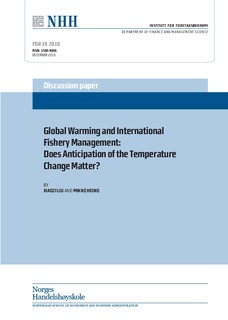Global warming and international fishery management : does anticipation of the temperature change matter?
Working paper
Permanent lenke
http://hdl.handle.net/11250/164009Utgivelsesdato
2010-12Metadata
Vis full innførselSamlinger
- Discussion papers (FOR) [566]
Sammendrag
This paper investigates the effects of climate-induced rising of ocean temperature on the optimal
fishing policies in a two players’ non-cooperative game setting. We compare reactive
management, under which the manager does not believe in or know about temperature trend,
with proactive management where the manager considers the future temperature change in his
decisions. We assume that the fish stock is initially solely owned by country one. As temperature
rises, the stock starts spilling over to the zone of the other country and eventually becomes under
its sole ownership. A stochastic dynamic programming model is developed to identify Nash
management strategies for the two players. The main findings are that anticipation of
temperature trend induces notable strategic interactions between two players. Knowing that it is gradually loosing the stock, country one is often harvesting more aggressively, whereas the country that is increasing its ownership harvests more conservatively. Compared to reactive
management, proactive management benefits both parties in terms of their cumulative pay-offs;
the biological stock is also larger much of the time. In most cases, the difference between two
management regimes is subtle, but when the stock is slow-growing and highly schooling, proactive management may save it from collapse.
Utgiver
Norwegian School of Economics and Business Administration. Department of Finance and Management ScienceSerie
Discussion paper2010:19
